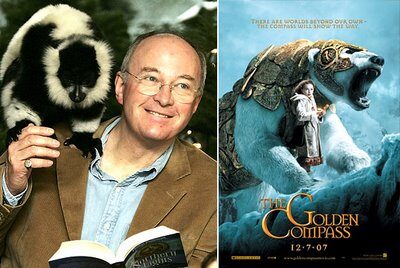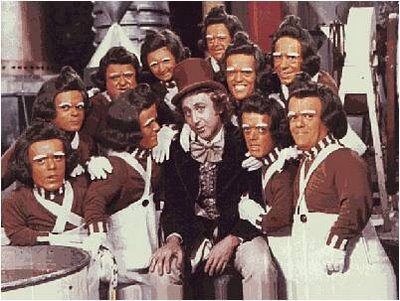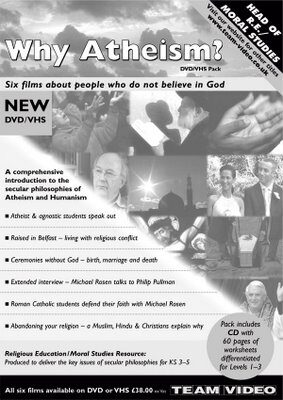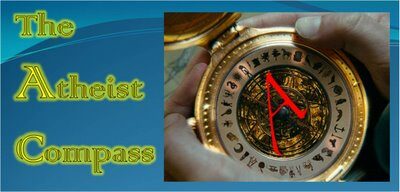Once Philip Pullman attempted to popularize his books, and the movie based one of them, in the USA he realized that he was no longer preaching to the Euro-Secular choir and decided to slow his roll (as they say in common parlance). Thus, the New York Magazine article entitled, Philip Pullman Realizes ‘Killing God’ Not the Ideal Sales Pitch. His books include “His Dark Materials” and the movie was “The Golden Compass.”
A shift in his sales pick to children is evidenced by the fact that first he denied that his works are “anti-religious” and stated, “As for the atheism, it doesn’t matter to me whether people believe in God or not, so I’m not promoting anything of that sort.”
Certainly, after all we are just dealing with mere fiction right? So what is the big deal? While the story is fiction the premise is Philip Pullman’s atheism spiked worldview,
“I was telling a story which would serve as a vehicle for exploring things which I had been thinking about over the years_Despite the armoured bears and the angels, I don’t think I’m writing fantasy. I think I’m writing realism. My books are psychologically real.”
For instance, his writes of friendly daemons, homosexual angels and claims that “‘The Fall’ is to be celebrated as the defining moment of mankind, rather than the source of all worldly evil” (Steve Meacham, The shed where God died).
Speaking of dealing with mere fiction I cannot help but recalling Dan Brown of The Da Vinci Code fame who stated, “How historically accurate is history itself?”1 Dan Brown claims to have based his novel on historical facts. His substandard double standard appears to be that whatever point he wants to make against Christianity is historically reliable but any correction of his errors are based on inaccurate history.
Continuing the line of evidence of a shift in his sales pick to children, please note that he had previously stated, “I’m trying to undermine the basis of Christian belief,” and “Mr. Lewis would think I was doing the Devil’s work.” “Mr. Lewis,” refers to C. S. Lewis who was an atheist before becoming a Christian.
Furthermore, he had stated, “My books are about killing God.”
Speaking of killing God in children’s books-Philip Pullman was asked by an eight year old, whose class was reading “The Golden Compass,” how he came up with the concept of “daemons.” To which he responds that it “came to me very suddenly and from nowhere_this daemon idea just came into my mind.” He describes a “daemon” as “a companion to speak to and share things with.”
In a more presupposition mood I might wonder what a daemon is, if we remove the letter “a” from the word? Really though, why not refer to them by a takeoff of the term Oompa Loompa, for example (they are certainly the stuff of nightmares, and I mean the original Loompas not that CG multiplied guy in the new movie)? Why not say, “Well little child, I got the idea from the fact that I base my books on undermine the basis of Christian belief. By the way, say hi to your public school teacher and tell her that I will send her autographed copies of my books about killing God.”
But why rehash outdated press about The Golden Compass? Because this is not about one movie nor a set of books, but about Philip Pullman as author and atheist activist. He wants to teach children about atheism in the classroom:
“For the first time, pupils are to be taught about atheism as part of religious studies in a course devised by two of the UK’s leading children’s writers_authors celebrated for their work for children, Philip Pullman and Michael Rosen, have produced a course on atheism for schools.”
There are two points of interest for me at this juncture:Atheists claim that atheism is not a religion (although some do, such as the atheist activist Michael Newdow). So why should atheism be taught in a religion class? It may belong in a philosophy, or logic, or history of ideas class but not religion class. Religion class is meant to teach about religions and not to pit one against the other.
Also, what would such a lesson look like? Inferring from what I am constantly told by atheists the class would last about two seconds and would run thusly, “Atheism is a lack of God belief, the end.” Or, “Atheism is not a worldview, not a belief, not a philosophy and oh, by the way-atheists are right and everyone else is wrong.”
Well, Philip Pullman draws a distinction between atheism and agnosticism, a distinction that many atheists deny,
“If we’re talking on the scale of human life and the things we see around us, I’m an atheist. There’s no God here. There never was. But if you go out into the vastness of space, well, I’m not so sure. On that level, I’m an agnostic.”
The UK’s The Independent noted,
“anyone who saw the stage translation of the books knows his appeal to teenagers_As the plays progressed, the average age of audiences at the National Theatre crashed to unprecedented levels.”
Atheists often appeal to children, teenagers and the youth in general because the youth are naturally rebellious and atheism encourages them to rebel against the ultimate authority-God. Moreover, atheism offers the consoling delusion of absolute autonomy and ultimate lack of accountability. Thus, Philip Pullman has produced a DVD entitled “Why Atheism?” which is geared towards children that are 11 years old and above. Elsewhere, I have chronicled that Prof. Richard Dawkins has also sought to push atheism into the classrooms: see Neo-Atheist Preacher.
One thing that I can agree with Philip Pullman about is the need for discussion and fair play understanding. For instance, he states,
“Science is not a matter of faith, and too many people are being allowed to get away with claiming that it is, and that my ‘belief’ in evolution is a thing of the same kind as their ‘belief’ in miracles.”
It is these sorts of generalization and misunderstandings that need ironing out. For example, it is far too generalized to state, “Science is not a matter of faith” since the term “science” ranges from observation and repeatable experimentation to mere worldview, or school of thought, based speculation (see my essay Scientific Cenobites for many examples of this). Likewise with the term “evolution” ranges from a bio-organism undergoing changes over time to the claim that life began when lightning struck a swamp and that God is therefore superfluous. When atheist activists, in the guise of scientists, make baseless claims such as that science leads to atheism it is no wonder why people begin to equate science with atheism (I mused on this topic in my essay Omni-Science). For example, PZ Myers stated that atheism and science are inseparable. Also, note that many atheist activists have snuck atheism into the back door of classrooms in the guise of science.
Sophie Kirkham (Atheism set to be taught in RE) reported,
“‘It is very much the intention that young people in the context of religious education should be studying non- religious beliefs,’ a spokesman for the QCA said [The Qualifications and Curriculum Authority (QCA), which regulates what is taught in schools].”
Yes, and they should do so in a class that is not meant to teach them about religions.
“The QCA’s proposals come as a left-wing think tank publishes a report tomorrow, calling for RE [Religious Education] to be renamed ‘spiritual education’ with less time spent on the life of Jesus and the Ten Commandments.”
Atheism would still not fit into the category (except, perhaps the Sam Harris sect).Yet, ultimately and obviously, this is not about furthering religious education but undermining it. The attempt is to water down “religion” and “God” and to overemphasize non-religious and non-God beliefs to the level of spiritual. For example “_environmentalism should also be added to the school curriculum, it [The Institute for Public Policy Research].”Moreover, “The think tank believes children as young as five should be told that there are people in the world who do not believe in God.”Furthermore, “The think tank believes children as young as five should be told_that there are alternatives to marriage and that those children with strong religious beliefs could be urged to question them and look at the reasons for their faith. Instead of referring to God they should be taught that there is a ‘divine being whose moral judgments are significantly more reliable than ours.’”
Thus, this new course is not meant to teach about religion but it is mean to undermine religion and elevate atheism, environmentalism and alternate lifestyles.2
Professor Emeritus C. A. Russell (Emeritus Professor of the History of Science, The Open University and University of Cambridge. Writing in Atheism on the curriculum) notes:
“Topics like the proper evaluation of evidence, the skilful use of argument, even the critical analysis of allegedly historical propositions would surely be much more appropriate. Such questions would be welcomed by sceptics but also by faith systems which have nothing to fear at the bar of reason.It is interesting that only a few days ago a step was taken in that direction by reinstating the Boyle Lectures at St Mary-le-Bow in the City of London. These have always been concerned with rational arguments about Christianity and its relationship with other knowledge, especially natural science. At a suitable level that kind of approach has much to be commended, even in schools.
However, lessons in atheism would be quite a different matter. They seem to me to be singularly pointless: lessons in nothing.”
The UK’s The Independent also noted, “What the pupils say…” and, perhaps unbeknownst to them, demonstrated just how faulty atheist propaganda is:
“Religion:
It makes it ‘them and us’, doesn’t it? And once you can see yourself as separate from another person it’s easier to inflict cruelty on them. Look at the British Empire. It was very much the tribesmen, they had their gods, while we were ‘civilised Christians’. And once you’ve got that, almost a way of believing that you’re better than somebody because you believe in the right god and they believe in the wrong god, it’s easier to justify your actions against them. Often powerful leaders use it as part of their way of getting into government or as a way of fighting their war, saying that you can kill but only for a just cause, and then they make that just cause their cause. So I think a lot of people can use it as a weapon for power and money.”
May one retort thusly?:
“Atheism:
It makes it ‘them and us’, doesn’t it? And once you can see yourself as separate from another person it’s easier to inflict cruelty on them. Look at the Communist Empires. It was very much the faithful, they had their God, while we were ‘civilised secularists’. And once you’ve got that, almost a way of believing that you’re better than somebody because you believe in the right science and philosophy and they believe in superstition, it’s easier to justify your actions against them. Often powerful leaders use it as part of their way of getting into government or as a way of fighting their war, saying that you can kill but only for a just cause, and then they make that just cause their cause. So I think a lot of people can use it as a weapon for power and money.”
What else is to be expected form an atheist activist? My only request would be to just come right out and be honest: do not pretend to write mere fiction when your goal is to discredit one particular religion and kill God. Do not pretend that atheism belongs in a religion class when its only purpose would be to criticize and claim to be the only truth. Quit attempting to smuggle atheism into the back doors of bookstores and classrooms, just come right out and be as honest in the USA as you are across the pond.




